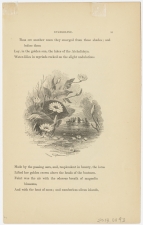Amid the conflict between New France and Britain during the French and Indian War, French Acadians living in Nova Scotia were forcefully deported by the English in 1755 after refusing to pledge allegiance to the British crown and renounce Catholicism. Families were split and forced to leave their villages and property behind, leaving many homeless and desperately in search of lost loved ones. This event, commonly known as Le Grand Dérangement, inspired Evangeline, an epic poem written in 1847 by American Henry Wadsworth Longfellow. The poem is known for its depiction of the tragic realities faced by the Acadians following their abrupt expulsion through the fictional story of a displaced Acadian woman. The poem details the scenery of her pilgrimage south and passage along the Mississippi River through Louisiana, where many displaced Acadians, later known as the Cajuns, settled after the expulsion. The poem describes Evangeline’s experiences as she seeks a reunion with her lost love, Gabriel, as well as her impressions of her new environment and longings to return home to her old life in Nova Scotia.
Among THNOC’s holdings relating to Evangeline are an autographed quotation by Longfellow and original hand-drawn illustrations by artist Birket Foster from a version of the poem published in 1892. THNOC also has a 1897 hardcover copy of the poem and numerous related historical resources. Evangeline has become a symbol of the Acadians’ plight after the heartbreak of Le Grand Dérangement and an important emblem of Cajun history and culture.

